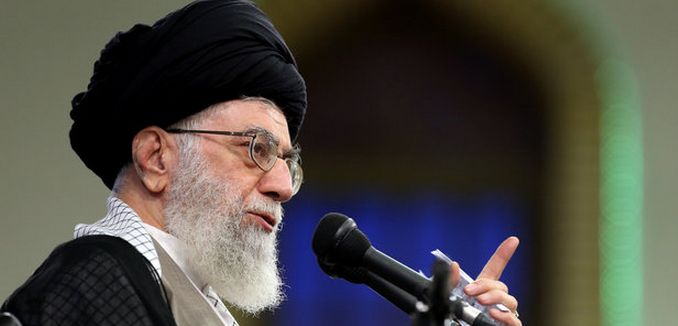A year after the nuclear deal with Iran was reached, Iranian Supreme Leader Ayatollah Khamenei and the Islamic Revolutionary Guard Corps have emerged as its biggest beneficiaries, Jay Solomon, the chief foreign correspondent for The Wall Street Journal, wrote in an essay on Saturday.
Khamenei achieved the major goals he wanted to secure in the negotiations: relief from crushing economic sanctions and the ability to build an industrial strength nuclear program. “Mr. Khamenei and his allies look to be the deal’s big winners,” Solomon wrote, adding that the next U.S. administration will have to decide whether “to continue to work with Iran or to challenge an increasingly entrenched supreme leader and his Revolutionary Guard.”
While Solomon observed that the nuclear deal temporarily limits Iran’s nuclear program, he pointed out that Khamenei plans to develop an industrial-sized nuclear program before the deal expires in 15 years. “The U.S. had won only a short-term pause in the expansion of the Iranian program, and the supreme leader had gained international approval for his longer-term plan,” he argued.
With Russian assistance, Iran is going ahead with plans to build 10 new nuclear reactors, which will use the enriched uranium that Iran will be allowed to produce from advanced centrifuges 10 years into the agreement. Mark Hibbs, a nuclear proliferation expert, cautioned that “The Revolutionary Guard controls the program, and there’s a risk that in 10 or 15 years, they might decide to restart their [weaponization] activities.”
In exchange for the temporary constraints on its nuclear program, the nuclear accord gave Iran sanctions relief that allowed it to revive its economy, Solomon noted. While Iranian leaders complain that Tehran has yet to fully integrate into the international financial system, Solomon reported that “Iran’s oil exports have largely returned to their pre-2012 levels, and the World Bank projects that Iran will see nearly 5% growth in its gross domestic product next year.”
The lack of full integration may very well suit Khamenei. “Far from hoping for a flood of foreign investment, the supreme leader has repeatedly warned his people that Western culture and business could undermine the revolution and its values,” Solomon observed. The IRGC, which controls many of Iran’s biggest companies, is increasingly arresting dual nationals — such as American-Iranian oil-industry executive Siamak Namazi — as a warning to other expatriates seeking to return to Iran in pursuit of business.
The nuclear deal has also not borne out the hopes of American and European officials who had hoped that it would “stabilize a roiling Middle East.” Instead, Iran has strengthened its cooperation with Russia in support of Syrian President Bashar al-Assad, while American commanders have seen “no tapering off of Revolutionary Guard support for its allies in Yemen, Iraq or the Palestinian territories.”
Furthermore, while the deal was supposed to be confined to Iran’s nuclear program, Khamenei insisted that a United Nations Security Council resolution against Tehran’s ballistic missile development be loosened. He also demanded that the UN prohibition on Iran buying and selling conventional arms be lifted. The agreement acquiesced to both demands, meaning that it “didn’t do much to curtail Iran’s ambitions,” Solomon wrote.
Karim Sadjadpour, an Iran expert and senior associate at the Carnegie Endowment for International Peace in Washington, wrote that “Ayatollah Khamenei has emerged as the single most powerful man in the Middle East.”
“[It] will take years to assess the full impact of the nuclear deal on the Middle East and in Iran internally, but the hope that the deal would weaken Khamenei and the Revolutionary Guards so far hasn’t been borne out,” Sadjadpour added.
The results of the nuclear deal that Solomon documented confirm many of the concerns expressed by experts last year. Lee Smith, a senior fellow at the Hudson Institute, wrote last July that the IRGC will strengthen its hold over Iran as a result of the deal.
Last May, Emanuele Ottolenghi and Saeed Ghasseminejad of the Foundation for Defense of Democracies similarly warned that the groups most likely to be strengthened by the nuclear deal were businesses controlled by Khamenei and the IRGC.
That the nuclear deal would fuel Iran’s regional ambitions rather than rein them in was predicted by a wide range of experts including including Foreign Policy editor David Rothkopf, former State Department official Aaron David Miller, Washington Institute of Near East Policy fellows Mehdi Khalaji, Soner Cagaptay and James Jeffrey, and former Secretaries of State Henry Kissinger and George Shultz.
[Photo: Mehr News ]




